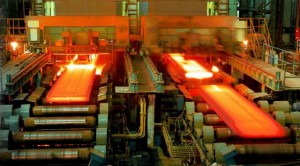The European steel industry is worried that a continental climate policy will engender regulatory carbon dioxide (CO2) costs that may undermine the sector’s wellbeing.

The greenhouse gas (GHG) of most relevance to the world steel industry is CO2. On average, 1.8 tonnes of CO2 are emitted for every tonne of steel produced. According to the International Energy Agency, in 2010 the iron and steel industry accounted for approximately 6.7% of total world CO2 emissions.
But defiant steel makers in Europe have joined hands and forged a campaign to protect their interests, ahead of the European Council meetings scheduled to hold in Brussels, Belgium 23-24 October, 2014. They insist that a climate policy should rather strengthen the industry so as to provide the products, jobs and incomes for the policy’s successful implementation.
In a letter to Heads of State and government, President of the European Parliament, President and President-elect of the European Council, and President and President-elect of the European Commission, 60 CEOs of the European steel industry are demanding from the October EU summit to give a clear guidance that the EU’s new climate and energy framework will not impose regulatory direct and indirect CO2 costs “on globally competing European industries”.
Declaring that they share the EU’s ambition to find an effective response to the climate change imbroglio, the group pointed out however that, to be effective, such response needs a policy that supports a healthy manufacturing industry with jobs on the continent.
“That would be a policy which benefits European society as a whole. Our products and products applications, our employees are the foundations for a carbon lean, energy efficient, and prosperous European society. There are not only four million jobs at stake in energy intensive industries in Europe but many more in the value chains and its dependent service sectors,” the CEOs wrote.
They went further, demanding: “Is it asking too much that at least the most CO2 efficient manufacturers in Europe must have no competitive disadvantage from EU climate policies vis-à-vis the global competitors?
“If no effective safeguard measures are taken, the EU Emission Trading System could cost the EU steel industry about 70 to 100 billion Euros in the first period from 2020 to 2030. The measures presently in place to protect the industry will largely run out by 2020. Free carbon allowances for even the most efficient installation will have been reduced by 75%, electricity prices for European industry are already twice as high as elsewhere and still rising enormously.
“It’s not sufficient to say that carbon leakage provisions should continue – they must continue at the level of 100% for the most efficient installations. They cannot be reduced or phased out through the backdoor by the so-called correction factor.
“In March 2014 the heads of State promised that the decision of the new policy framework will provide the necessary basis for growth for its economic operators. We the CEOs of the industry in Europe now trust in this promise.”
The CEOs are: Aditya Mittal (CEO, ArcelorMittal Europe), Andreas J. Gross (CEO, ThyssenKropp Steel Europe AG), Karl Kohler (CEO and Managing Director, Tata Steel Europe), Francesc Rubiratta i Rubio (Chiarman and CEO, Celsa Group), Cesare Riva (CEO, Riva Fomi Elettrici), Heinz Jorg Fuhmmann (CEO, Salzgitter AG), Martin Lindqvist (President and CEO, SSAB AB), Wolfgang Elder (Chairman and CEO, Voestalpine AG), Lucia Morcelli (CEO, Accial Speciali Temi SpA), Geovanni Arvedi (President Acciaieria, Arvedi SpA), Bernardo Velazquez (CEO, Acerinox), Philippe Darmayen (CEO, Aperam), Andre Sombecki (CEO, Benteler Steel/Tube GmbH), Jerzy Kozicz (President, CMC Poland Sp. Zo.o.), Gunnar Kohlschein (CEO, BGH Edelstahlwerke GmbH), Roberto Marzorati (Vice-President, Cogne Acciai Speciali), Eneas Garcia Diniz (CEO, Companhia Siderurgica Nacional), Martin Lowendick (CEO, Deutsche Edelstahlwerke GmbH), Karlheinz Blessing (CEO, Dillinger Huttle/Saarstahl AG), Antonio Gozzi (CEO, Duferco Belgium), Ivan Kroo (Director, Dutrade Steels Products Processing and Trade Co), Dmitrij Scuka (Chairman of the Board of Directors, Evraz Vitkovice Steel a.s.), Goran Ek (Managing Director, Fagersta Stainless AB), Giuseppe Pasini (President, Feralpi Siderurgica SpA), Pieter van Buren (CEO, FNSteel BV), Gunna Lohmann-Hutte (Managing Director, Friedr. Lohmann GmbH), Peter van Hullen (Georgsmarienhutte Holding GmbH), George Skindilias (Vice-President and CEO, Halyvourgiki Inc.), Vasil Vasilev (Manager, Helios Metalurg Ltd), Vassilios Goumas (CEO, Hellenic Halyvourgia SA), Melker Jernberg (CEO and President, Hoganas AB), Istvan Orova (Director, ISD Cokin Plant Ltd), Evgeny Tankhilevich (CEO, ISD Dunaferr) and Horacio Malfatto (CEO, NLMK Europe).
Others include: Mika Seitovirta (President and CEO, Outokumpu Oyj), Tom Erixon (President and CEO, Ovako), Imre Bartha (Director, Ozd Steelworks Ltd), Viktor Dembitski (Executive Director, Promet Steel), Pablo Ignacio Battistini (General Manager, Rodacciai SpA), Dirk Mahnke (Rohrwerk Maxhutte GmbH), Petra Einarsson (CEO, Sandvik Materials Technology), Nikolaos Mariou (General Manager, Sidenor SA), Jose Enrique Freire Arteta (CEO, Siderurgica Nacional SA), Anton Chernykh (President of the Board and CEO, SIJ-Slovenska industrija jekia, d.d.), Markus Ritter (Managing Director, Stahl-und Walzwerk Marienhutte GmbH), Eneas Garcia Diniz, (CEO&SWT Managing Director, Stahlwerk Thuringen GmbH), Emil Zhivkov (Executive Director, Stomana Industry SA), Marjan Mackosek (Managing Director, Store Steel d.o.o.), Luca Zanotti (Vice-President and Managing Director, TenarisDalmine), Adrian Popescu (CEO, TMK-ARTROM/TMK-RESITA), Jan Czudek (CEO, Trinecke Zelezamy), Jesus Esmoris (CEO, Tubacex SA), Enrique Arriola (CEO, Tubos Reunidos), George Babcoke (President, U.S.Steel Kosice), Patrick Lamarque d’Arrouzat (CEO, Ugitech), Philippe Crouzet (CEO, Vallourec SA), Sergiy Pronin (Director for Economics and Business, Dev Vorskia Steel Denmark A/S) and Vladmir Sotak (CEO, Zeleziame Podbrezova Slovakia).
